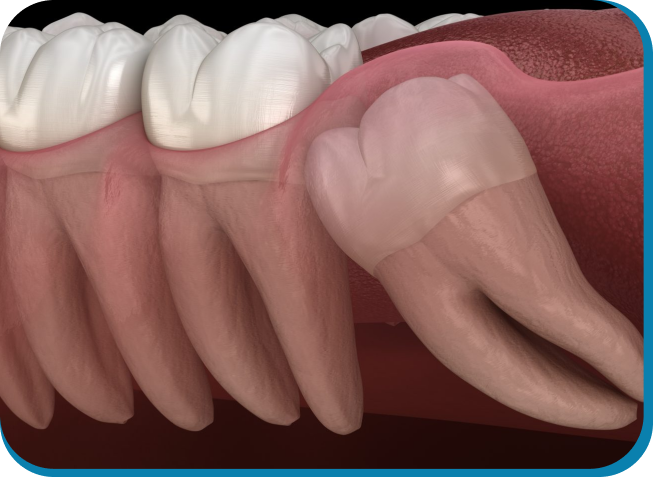Wisdom Tooth Surgery
Postoperative Care
Wisdom Tooth Surgery: Postoperative Care
Wisdom tooth surgery is the surgical extraction of one or more wisdom teeth. It is commonly found toward the back of the mouth, with two on top and two on the bottom. It generally affects people aged 17 to 25.
Wisdom teeth extraction is a frequent dental treatment, but good after-care is essential for a speedy and pleasant recovery. In this detailed guide, we will give you step-by-step instructions as well as helpful advice to make your recovery process as easy and trouble-free as possible.
Whether you’ve recently had the operation or are preparing for it, this blog will help you recover quickly and successfully. Let’s use this path to improve our oral health together.
Contact Us
Get in Touch

What is wisdom tooth surgery?

Wisdom teeth extraction is a frequent operation that tries to resolve these difficulties and prevent complications. It involves carefully removing one or more wisdom teeth, usually under local or general anesthesia, in order to improve oral health and prevent future dental issues.
What are the reasons dentists recommend wisdom teeth surgery?
Dentists may prescribe wisdom teeth extraction for a variety of reasons, the most common being oral health issues and the likelihood of dental problems. Here are some of the most common reasons why dentists recommend wisdom teeth extraction.
- Impaction
- Crowding
- Infection or Pericoronitis
- Decay and Gum Disease
- Cysts and Tumors
- Pain and Discomfort
- Prevention
Prepare yourself before having wisdom teeth surgery
- Schedule an appointment with your dentist or oral surgeon.
- Understand the technique and be ready to ask questions.
- Make transportation arrangements on the day of surgery.
- Before the operation, follow the fasting recommendations.
- Consult your dentist to check and adjust your prescriptions.
- Dress comfortably and loosely.
- Obtain postoperative care supplies.
- Plan time off for rest and recovery.
- Share your allergy and medical history.
- Follow any additional pre-operative instructions that are offered.
What are the things you need to consider after getting wisdom tooth surgery?
Things to Do After Wisdom Tooth Surgery
Bite Down on Gauze: To minimize bleeding, use the gauze pads recommended by your dentist or oral surgeon. Change them as needed.
Pain Management: Take pain relievers as prescribed by your dentist or oral surgeon. Over-the-counter pain relievers can also be used if your doctor prescribes them.
Swelling and Ice Packs: For the first 24 hours, apply an ice pack to the operation site to reduce swelling. Use it in 20-minute intervals (20 minutes on and 20 minutes off).
Diet: For the first several days, follow a soft or liquid diet. Instead, choose yogurt, applesauce, mashed potatoes, soup, or smoothies. Avoid foods that are hot, spicy, or hard since they may irritate the surgical sites.
Hydration: Stay hydrated by drinking plenty of water. Straws should be avoided since the sucking motion might release blood clots.
Oral Hygiene: Take your dentist’s oral hygiene instructions. Rinse your mouth gently with warm salt water as directed by your dentist. Brushing and flossing should be continued on a regular basis but with caution around the surgical sites.
Appointments: Attend all planned follow-up appointments with your dentist or oral surgeon for assessment and, if necessary, stitch removal.
Things to Avoid After Wisdom Tooth Surgery
Tobacco and Smoking: Avoid smoking or using tobacco products since they can impede healing and raise the risk of infection.
Alcohol: Alcohol should be avoided during the early recovery period since it might interact with medicines and slow healing.
Straws and Sucking Motions: Avoid using straws since the suction might dislodge blood clots and slow healing.
Foods: Avoid foods that are rough, crunchy, or have sharp edges since they might irritate or injure the operation areas. Avoid spicy and hot meals since they may create discomfort or irritation in the healing regions.
Strenuous activity: Avoid vigorous activity, hard lifting, and bending over for several days to limit the risk of bleeding and complications.
Mouthwash: Avoid using alcohol-based mouthwash since it might irritate surgical regions.
Touching or Poking the Surgical Sites: Resist the urge to touch or poke the surgical site with your fingers or tongue.
Skipping drugs: Take prescription drugs precisely as directed, and do not skip doses without visiting your doctor.
Ignoring Infection or Complication symptoms: If you have significant bleeding, severe pain, prolonged swelling, fever, or symptoms of infection, contact your dentist or oral surgeon immediately.
Following these ideas can help you recover quickly and easily following wisdom tooth surgery. During the postoperative period, it is vital to be patient and thorough in your dental care.
Conclusion
If you have any questions or concerns regarding your recovery, get in touch with your dentist. Following adequate postoperative care is the first step toward a painless and healthy smile.
